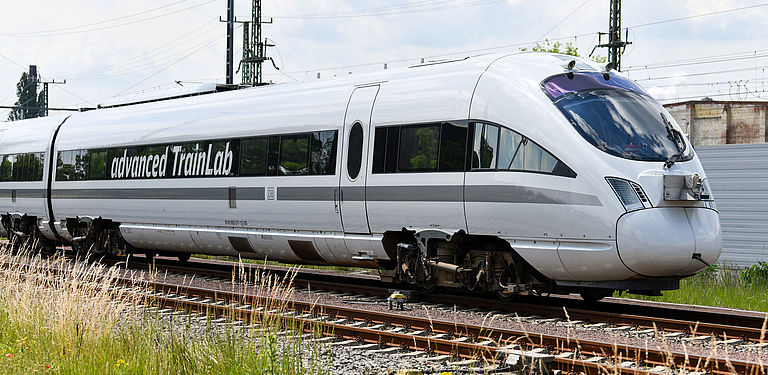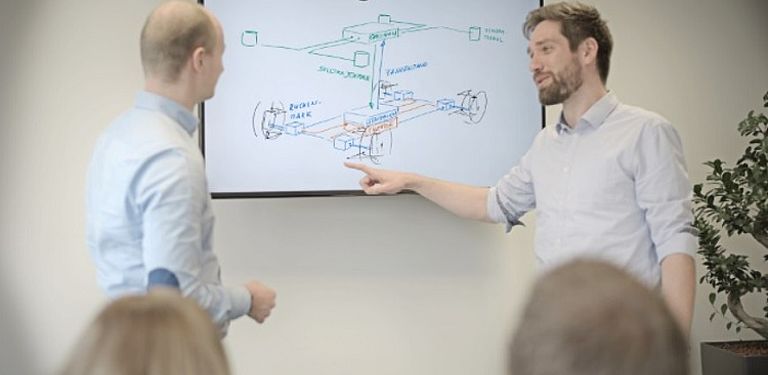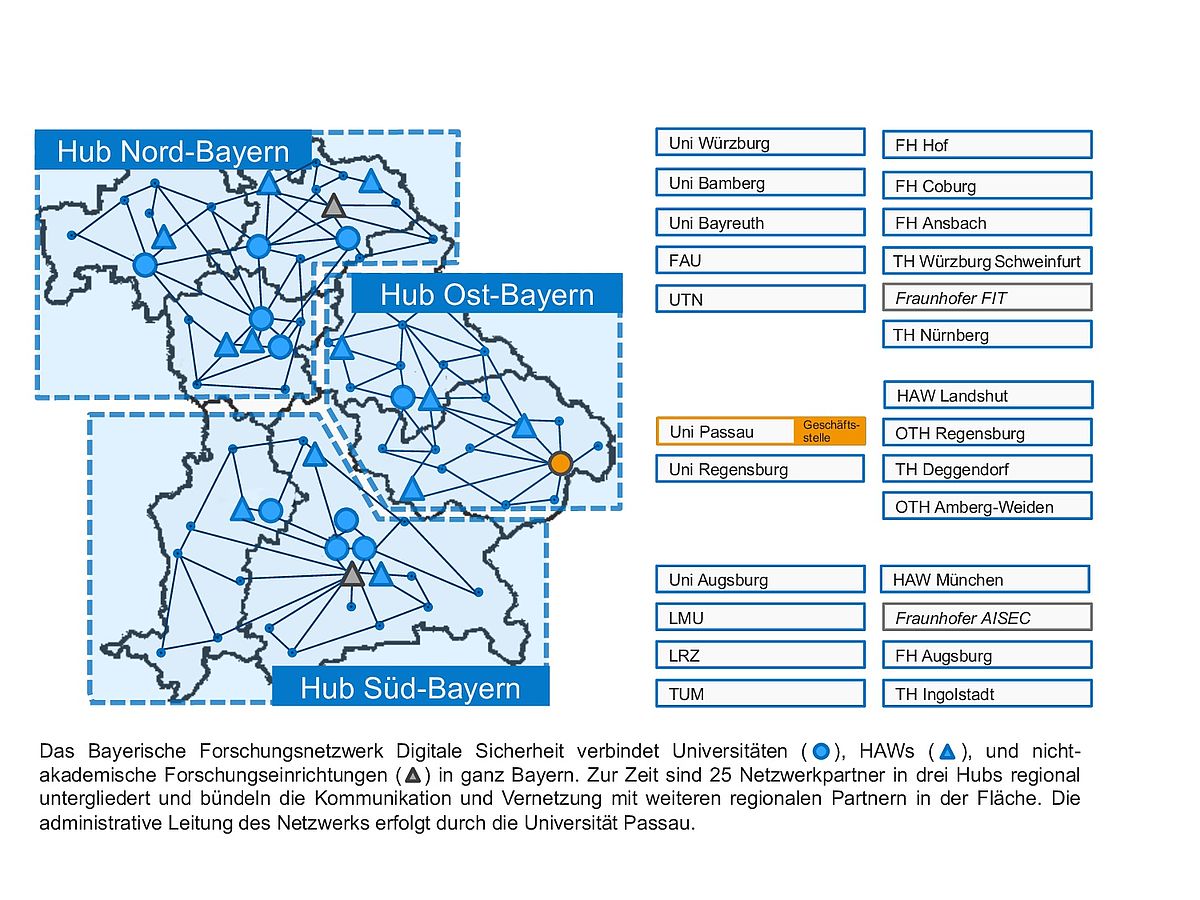Opening by Prof. Ulrich Bartosch, President of the University of Passau (Photo: University of Passau)
Experts from industry and academia met on Wednesday, September 13, at the University of Passau to discuss the "secure and reliable use of AI". Expert presentations and discussion rounds provided an opportunity to look beyond the current hype around generative AI systems like ChatGPT, explore the issues at hand and identify solutions. Arvid Rosinski, Chief Information Security Officer at AUDI AG, was one of the guest speakers.
In front of fifty invited guests, University President Professor Ulrich Bartosch opened the event and underscored the importance of IT security research for the secure and reliable use of AI systems. "The University of Passau will not relent in its endeavour to establish vigorous, networked research and development in collaboration with Bavarian universities and universities of applied sciences for the purpose of adding to Bavaria's defensive strength," said Bartosch. His opening address was followed by lectures from computer scientist Professor Stefan Katzenbeisser, who holds the Chair of Computer Engineering at the University of Passau, and Professor Michael Granitzer, who holds the Chair of Data Science. Katzenbeisser spoke about related research projects currently undertaken at the Passau Institute of Digital Security (PIDS) which integrates digital security research in an interdisciplinary framework at the University of Passau (with chairs in economics, sociology, mathematics, law and computer science). Granitzer gave an account of the problems and risks that AI systems entail and provided an introduction to the fundamentals of contemporary AI systems and their basic structure both essential for a better understanding of the matter.
The University of Passau will not relent in its endeavour to establish vigorous, networked research and development in collaboration with Bavarian universities and universities of applied sciences for the purpose of adding to Bavaria's defensive strength
Professor Ulrich Bartosch, President of the University of Passau
Arvid Rosinski (Chief Information Security Officer of AUDI AG) then explained how AI is put to use in a company like AUDI AG. According to him, AI has been used where appropriate for a long time already, and successfully so, but always only after a careful analysis and risk assessment. "The possibilities that AI offers in an operational environment have recently brought a lot of attention to this topic on account of ChatGPT. I am positive that a higher degree of integration with academic research holds great promise. I would be delighted to see this dialogue continued," said Rosinki.
There was a general consensus that further research is required and that development potential exists. Interdisciplinary collaboration is necessary to ensure secure and reliable use of artificial intelligence. Professor Michael Granitzer expressed his concern: "At a time when AI systems are becoming increasingly pervasive in virtually all spheres of human life, a quick, intersectoral and interdisciplinary research approach is essential to guarantee security and reliability". Special emphasis was placed on the know-how needed to accurately assess the AI system and use it securely as a tool.
At a time when AI systems are becoming increasingly pervasive in virtually all spheres of human life, a quick, intersectoral and interdisciplinary research approach is essential to guarantee security and reliability.
Professor Michael Granitzer, Chair of Data Science
In the ensuing panel discussion chaired by the project leader Dr Henrich C. Pöhls, the speakers were joined by Taras Holoyad (in charge of AI standardisation at the Bundesnetzagentur) and Professor Joachim Posegga (who holds the Chair of IT Security at the University of Passau). Posegga likened the disruptive power of existing generative AI systems with the impact that internet access had on private households. He sees a connection with the problem that AI systems – ever since ChatGPT was rolled out – are no longer intended for safe and reliable use by specially trained staff only but by any user whatsoever. Taras Holoyad offered the roughly fifty attendees a sense of the standardisation initiatives currently underway in Germany and Europe. He explained: "In collaboration with research and industry, the Bundesnetzagentur is developing methods to evaluate AI systems, particularly in terms of transparency and explainability. At the same time, related concepts are giving rise to national and, beyond that, to global standardisation efforts. In the scope of this collaboration, the Bundesnetzagentur has set out to discuss specific implementations for existing AI systems with a view to ensuring consistent application of these concepts. From this perspective, the agency seeks to foster a trustful relationship with AI, especially with regards to the implementation of legal requirements arising from the proposed European law on AI".
Projects on Cyber Security and Data Protection
During the break and after the panel discussion, participants were given a chance to engage with the experts. From the research perspective and through the lens of users, security and reliability play a very important role in the use of AI systems. Security and reliability are essential prerequisites for the extensive and trustful use of technologies in our society – everyone was in agreement on that point – and this notion is all the more true for new generative AI systems. The importance of drawing on the expertise already available in Bavaria to generate even more research and ensure even better training in this particular application of digital security was voiced by many participants.
The idea of connecting universities, universities of applied sciences, extra-university research institutions and users in industry and society in a Bavaria-wide research network, as proposed by the initiative "Bayerisches Forschungsnetzwerk Digitale Sicherheit", was met with wholehearted approval during the talks. The network's objective is to encourage new as well as further strengthening of ongoing collaboration efforts among leading researchers at various Bavarian sites who already have considerable expertise in digital security.
The University of Passau will take on the administrative management of the proposed network. Its task will be to set-up and coordinate a sustainable networking, to perform essential administrative functions for the network as a whole and to coordinate internal as well as joint public activities across the network. There has never been such a research network on "Digital Security" in Bavaria or, for that matter, in Germany. The presidents of Bavarian universities had reiterated their eagerness to build the Research Network for Digital Security as a joint initiative and declared their intention to take part in its activities as early as on 17 March 2023.
Consisting of three regional divisions for Southern, Eastern and Northern Bavaria, the planned network will also tie in regional users from business and society with their own specific issues and local solutions. This will leverage Bavarian expertise in digital security in a coordinated manner in pursuance of "distributed excellence" and represents the best conceivable way to boost the resilience of Bavarian businesses and society against digital attacks that threaten their survival.
Professor Stefan Katzenbeisser
How can critical infrastructures in a networked world be protected against cyber attacks?
How can critical infrastructures in a networked world be protected against cyber attacks?
Professor Stefan Katzenbeisser holds the Chair of Computer Engineering at the University of Passau. He conducts research on cyber security in embedded systems, on secure critical infrastructures and on technical data protection. He is spokesperson of the new research cluster "ForDaySec - Security in everyday digitalisation", which is funded by the Bavarian Science Ministry and where researchers from computer science, law and sociology have come together to develop new types of technical procedures to provide security in day-to-day digital life. Besides participating in research projects on secure mobility, he is also involved in the research initiative "6G Research and Innovation Cluster (6G-RIC)" which is coordinated by Fraunhofer HHI and aims to develop mobile telecommunication systems of the sixth generation by pushing back the limits of technology.
Professor Michael Granitzer
How can contexts of meaning be identified in a deluge of digital media?
How can contexts of meaning be identified in a deluge of digital media?
Professor Michael Granitzer holds the Chair of Data Science. His research focuses on the use of machine-based learning methods and intelligent human-machine interfaces.
Professor Joachim Posegga
How to make IT applications secure in everyday life?
How to make IT applications secure in everyday life?
Professor Joachim Posegga holds the Chair of IT Security at the University of Passau. He earned his doctorate at Karlsruhe Institute of Technology (KIT) and conducted industrial research in the field of security for a period of ten years before he was appointed head the Research Group "Security in Distributed Systems" of the Department of Informatics at the University of Hamburg. In 2009, he moved on to Passau and was appointed head of the Institute for IT Security and Security Law (ISL). In his research, he focuses on web security, security architectures and protocols, placing a special emphasis on the Internet of Things.































